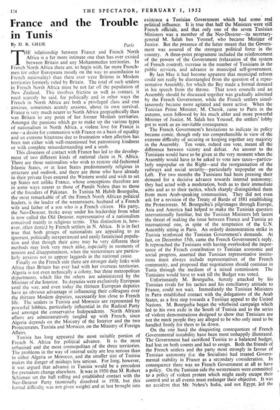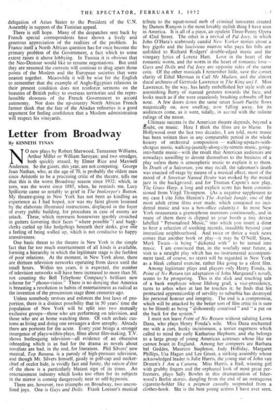France and the Trouble in Tunis
THE relationship between France and French North Africa is a far more intimate one than has. ever existed between Britain and any Mohammedan territories. In French North Africa there are, to begin with, far more French- men (or other Europeans mostly on the way to assimilation to French nationality) than there ever were Britons in Moslem territories formerly ruled by Britain. The total of such settlers in French North Africa must be not far off the population of New Zealand. This involves friction as well as contact, it need scarcely be said, for politically and in other ways the French in North Afri,ca are both a privileged class and one anxious, sometimes acutely anxious, about its own survival. France is very much nearer to North Africa geographically than was Britain to any point of her former Moslem territories. Amongst the passions which go to make up the various types of nationalism in North Africa, a violent love for France is one—a desire for communion with France on a basis of equality and an extreme bitterness due to frustration when affection has been met either with well-intentioned but patronising kindness or with complete misunderstanding and a snub. This closeness of contact with France has led to the develop- ment of two different kinds of national claim in N. Africa. There are those nationalists who wish to restore old-fashioned Islamic States, or at least States predominantly religious in structure and outlook, and there are those who have already in their private lives entered the Western world and wish to set up States not unlike France, whose conceptions therefore are in some ways nearer to those of Pandit Nehru than to those of the founders of Pakistan. In Tunisia M. Habib Bourguiba, the most remarkable of all the French North African political leaders, is the leader of the westernisers, husband of a French wife and father of a son who is a French citizen. His party, the Neo-Destour, broke away under his leadership from what is now called the Old Destour, representative of a nationalism conceived mainly in religious terms. This distinction is, how- ever, often denied by French settlers in N. Africa. It is in fact true that both groups of nationalists are appealing to an ignorant, politically inexperienced and easily fanatieised popula- tion and that though their aims may be very different their methods may look very much alike, especially in moments of tension and disappointment, when the westernisers are particu- larly anxious not to appear laggards in the national cause. Finally on the French side there are stronger daily links with Africa than Britain has ever had with her overseas territories. Algeria is not even technically a colony, but three metropolitan departments, which like the others are administered by the Minister of the Interior. Its deputies were exclusively European until the war, and even today the thirteen European deputies have an obvious advantage in influencing their colleagues over the thirteen Moslem deputies, necessarily less close to French life. The settlers in Tunisia and Morocco are represented by powerful lobbies, particularly influential in the Radical .Party and amongst the conservative Independents. North African affairs are administratively tangled up with French, since Algeria depends on the Ministry of the Interior and the two Protectorates, Tunisia and Morocco, on the Ministry of Foreign Affairs.
Tunisia has long appeared the most suitable portion of French N. Africa for political advance. It is the most urbanised and the most cosmopolitan pf the three -territories. The problems in the way of internal unity are less serious than in either Algeria or. Morocco, and the smaller size of Tunisia makes the danger of mishaps less serious. For long, however, it was argued that advance in Tunisia' would be a precedent for premature change elsewhere. It was in 1950 that M. Robert Schuman set the ball rolling and established contact with the Neo-Destour Party (nominally dissolved in 1938, but this formal difficulty was not given weight) and at last brought into existence a Tunisian Government which had some real political influence. It is true that half the Ministers were still French officials, and that only one of the seven Tunisian Ministers was a member of the Neo-Destonr—its secretary- general M. Salah ben Youssef, who became Minister of Justice. But the presence of the latter meant that the Govern- ment was assured of the strongest political force in the country. A three-point programme included the reinforcement of the powers of the Government (relaxation of the system of French control), increase in the number of Tunisians in the public services, and advance in municipal self-government. By last May it had become apparent that municipal reform could not really be disentangled from the question of a repre- sentative Assembly, for which the Bey' made.a formal demand in his speech from the throne. That town councils and an Assembly should be discussed together was gradually admitted by the French Government, while the French settlers simul- taneously became more agitated and more active. When the Tunisian Prime Minister, M. Chenik, came to Paris in the autumn, soon followed by his much abler and more powerful Minister of Justice, M. Salah ben Youssef, the settlers' lobby got to work as an inevitable consequence.
The French Government's hesitations to indicate its policy became comic, though only too comprehensible in view of the extreme difficulty of securing or keeping together any majority in the Assembly. Ten votes, indeed one vote, meant all the difference between victory and defeat. An answer to the Tunisians would have to be given at the very moment when the Assembly would have to be asked to vote new taxes—particu- larly unpopular on the Right—and the reorganisation of the railways and social security—particularly unpopular on the Left. For two months the Tunisians had been pressing their demand for a decisive advance towards internal autonomy; they had acted with a moderation, both as to their immediate aims and as to their tactics, which sharply distinguished them from most Arab-speaking communities. They did not even ask for a revision of the Treaty of Bardo of 1881 establishing the Protectorate. M. Bourguiba's pilgrimages through. Europe, Asia and America had helped to make the Tunisian question internationally familiar, but the Tunisian Ministers left latent the threat of making the issue between France and Tunisia an international one, in spite of the temptation of the U.N. Assembly sitting in Paris. An orderly demonstration strike in Tunisia reinforced the Tunisian Government's demands. At last, on December 15th, came the French Government's reply. It reproached the Tunisians with having overlooked the impor- tance of the French contribution to Tunisian economic and social progress, asserted that Tunisian representative institu- tions must always include representatives of the French community, and proposed that negotiations should continue in Tunis through the medium of a mixed commission. The Tunisians would have to wait till the Budget was voted.
Unfortunately M. Bourguiba, fiercely attacked by his Tunisian rivals for his tactics and his conciliatory attitude to France, could not wait. Immediately the Tunisian Ministers in Paris established contact with the delegations of the Arab States, as a first step towards a Tunisian appeal to the United Nations. M. Bourguiba began the whirlwind campaign which led to his own exile in the South of Tunisia and to the series of violent demonstrations designed to show that Tunisians are not the meek people they are alleged to be who only need to be handled firmly for them to lie down.
On the one hand the disquieting consequences of French Governmental instability have been most unhappily illustrated. The Government had sacrificed Tunisia to a balanced budget, had lost on both counts and had to resign. Both the friends of the French settlers and the party most strongly in favour of Tunisian autonomy (i.e. the Socialists) had treated Govern- mental stability in France as a secondary consideration. In consequence there was no French Government at all to have a policy. On the Tunisian side the westernisers were committed to a policy of violent protest which might easily escape their control and at all events must endanger their objective. It was no accident that Mr. Nehru's India, and not Egypt, :led the delegation of Asian States to the President of the U.N. Assembly in support of the Tunisian appeal.
There is still hope. Many of the despatches sent back by French special correspondents have shown a lively and generous appreciation of the realities of the problem. In France itself a North African question has for once become the primary problem of the Government, a fact which to some extent raises it above lobbying. In Tunisia it is obvious that the Neo-Destour would like to resume negotiations. But until they are resumed the currents will continue to drag apart those points of the Moslem and the European societies that were nearest together. Meanwhile it will be wise for the English to remember that the example of Anglo-Egyptian relations in their present condition does not reinforce sermons on the beauties of British policy to overseas territories and the repre- hensible slowness of the French Government to accord autonomy. Nor does the up-country North African French farmer think that the fate of the Abadan refineries is a good argument for feeling confidence that a Moslem administration will respect his vineyards.



































 Previous page
Previous page